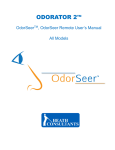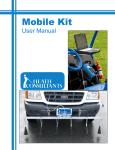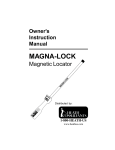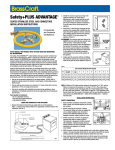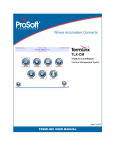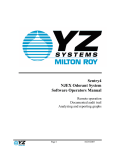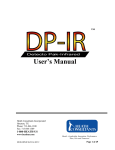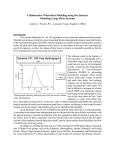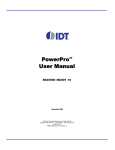Download User Manual PDF - Heath Consultants
Transcript
ODORATOR 2TM Operator’s Manual All Models Proprietary Notice The contents of this instruction manual are proprietary to Heath Consultants Incorporated. Reproduction of this manual, in whole or in part, is prohibited without the express written consent of Heath Consultants Incorporated. Heath Consultants Incorporated operates under a continual product improvement program and reserves the right to make improvements and / or changes without prior notification. This manual supersedes all previous manuals for this instrument. COPYRIGHT 2015, HEATH CONSULTANTS INCORPORATED. Operator’s Manual, ODORATOR 2, HPN: 104147 Rev. B OdorSeer Manual, ODORATOR 2, HPN: 104189 Rev. B ODORATOR 2, Complete, HPN: 104175 ODORATOR 2 Operator’s M anua l Models: 1.00 % Methane 0.50 % Methane 0.15 % Methane 0.44 % Propane Heath Consultants Incorporated 9030 Monroe Road Houston, TX 77061 Tel: 713-844-1300 www.heathus.com Heath…Safety, Leadership, Innovation, Performance Then, Now and Tomorrow TABLE OF CONTENTS Introduction …………………………………………………………….………………………… Warnings and Cautions …………………………………………….……….………………….. Use At Elevation ……………………………………………………………………………….... Use at Low Temperature Extremes ……………………………………………………………. List of Contents ………………………………………………………….…………………….… Power On Sequence ……………………………………………………………………………. Test Mode Sequence …………………………………………………………………………… 1 2 4 4 4 5 5 CHAPTER ONE Instructions for Operation …………………………………………………….………………... Odor Threshold Level and Relative Odor Intensity Tests Procedure ………………… Bluetooth ……………………………………………………………………………………. ODORATOR 2 Operator Controls and Connectors ……………………………………. Figure 1. ODORATOR 2 Top Panel Layout ……………………………………. Figure 2. ODORATOR 2 Rear Case View …………………………………….. Battery Charging ………………………………………………………………………..………. Battery Pack Replacement …………………………………………………………………….. 6 6 9 9 9 10 10 11 CHAPTER TWO Periodic Test …………………………………………………………………………………….. Calibration ……………………………………………………………………………………... 12 12 CHAPTER THREE Troubleshooting Chart ………………………………………………………………………….. Parts List …………………………………………………………………………………………. Appendix A - Periodic Test Records ………………………………………………………….. 13 13 14 CHAPTER FOUR Warranty and Warranty Repair ……………………………………………………………… Return Procedure (RMA) …………………………………………………………………….. Sales, Customer Service and Instrument Repair Locations ……………………..………. Notes …………………………………………………………………………………………… 17 18 19 20 Introduction The ODORATOR 2 is a handheld, portable, electronic GNSS based audit system used to evaluate and record the odor levels within a utility’s gas stream with respect to actual test locations. Natural gas (methane) and propane are two common gases typically odorized and distributed for consumption. Sample gas to be tested enters the ODORATOR 2 through the quick connect fitting at the gas supply inlet port. Internally, the sample gas passes through an internal five micron filter to the input of a low pressure regulator. It then passes from the output of the low pressure regulator to the flow metering valve. This valve, located on the top panel of the ODORATOR 2, is controlled by the operator. After passing through the valve (when partially opened), the gas enters a mass flow sensor. This is the heart of the ODORATOR 2. The mass flow sensor responds to gas flow within the range of the flow metering valve. The signal from the mass flow sensor is then converted to a digital signal, processed and fed to a liquid crystal display (LCD) for the operator’s use. Metered gas from the mass flow sensor then passes to the mixing chamber where it is combined with fresh air drawn in by a blower. The operator then sniffs the gas / air mixture at the exhaust port as part of the test. If no odor is detected in the exhaust mix, the flow metering valve is incrementally opened and the exhaust port sniffed until odor is readily detectable at which time the operator presses the READ switch to automatically record the corrected percent gas in air by volume, GNSS location (GPS and/or GLONASS), test time, test date and various instrument parameters. While driving to the various test points in the distribution system the ODORATOR 2 may also automatically record the GNSS location, date, time and various instrument parameters to be able to show the actual breadcrumb trail used. The electronics and the speed of the blower are calibrated so that the concentration of the gas / air sample at the exhaust port agrees with the LCD reading at 20% of the Lower Explosive Level (LEL) or at a pre-determined point less than 20% of the LEL. For methane or natural gas the LEL is typically 5.0% and for propane the LEL is typically 2.2%. All readings are automatically corrected for atmospheric pressure and temperature via an embedded microcontroller and associated sensors. Depending on how far the flow metering valve is opened, the concentration of gas in air at the exhaust port will be anywhere from zero up to approximately 2% for methane. An alarm and the display alert the operator of instrument status, problems or high reading values. INTRODUCTION The ODORATOR 2 continuously monitors its health and operational status. Typical operational checks include but are not limited to: blower speed, battery state-of-charge, GNSS, memory card, communications buss, power supplies and calibration interval. Included but not required for odor level testing is OdorSeer and OdorSeer Remote PC software for managing the recorded data, mapping, report generation, instrument configuration and remote data access. Connectivity interfaces include USB 2.0 and Bluetooth. Refer to the OdorSeer / OdorSeer Remote manual for details. A replaceable, rechargeable Li Ion battery pack is used to power the ODORATOR 2. An external power supply is used to re-charge the battery pack. The ODORATOR 2 is designed and intended to be used in accordance with the GPTC Guide For Gas Transmission And Distribution Piping Systems (49 CFR) 192.625 Subpart L dated 10-1-13, the American Society For Testing And Materials Standard D 6273 – 08 and NFPA 58 for performing odor threshold 1 level and relative odor intensity tests. Supply gas must be natural gas (methane) or propane and of high quality. Blended or mixed gases as sometimes found during peak shaving cannot be tested using the ODORATOR 2. Warnings and Cautions Prior to use, the operator should read all warnings and cautions, instructions for operation and maintenance r e q u i r e m e n t s contained in this operator’s m a n u a l . WARNING: DO NOT USE THE ODORATOR 2 OR BREATHE IN GAS FROM SOURCES WHICH MAY CONTAIN TOXIC LEVELS OF CHEMICALS SUCH AS 2HYDROGEN SULFIDE (H2S) AS IT COULD BE HARMFUL TO HUMAN HEALTH AND SAFETY TO DO SO. SOURCES WHICH MAY CONTAIN TOXIC LEVELS OF CHEMICALS INCLUDE BUT ARE NOT LIMITED TO PRODUCTION SYSTEMS AND LANDFILLS. It is the sole responsibility of the product purchaser/ owner to ensure that: (1) all operators of the ODORATOR 2 read, understand, and comply with the precautions, instructions for operation and maintenance requirements contained in this manual; (2) the ODORATOR 2 is only used in a proper and safe manner; and (3) while using the ODORATOR 2, operators are not inhaling or sniffing dangerous materials that could cause injury or death. WARNING: DURING OPERATION, KEEP THE ODORATOR 2 AWAY FROM OPEN FLAMES. INLET SUPPLY PRESSURE SHOULD NOT EXCEED FOUR PSIG. INLET PRESSURES IN EXCESS OF FOUR PSIG COULD RUPTURE THE LOW PRESSURE REGULATOR DIAPHRAM, VENT THE GAS OUT OF THE INSTRUMENT AND CAUSE INSTRUMENT FAILURE. THE RECOMMENDED INLET SUPPLY PRESSURE IS 7” WATER COLUMN. WHEN OPERATING THE ODORATOR 2 YOU WILL BE WORKING WITH FLAMMABLE METHANE OR PROPANE GAS WHICH IS POTENTIALLY DANGEROUS IF NOT HANDLED PROPERLY. METHANE GAS FROM A LECTURE BOTTLE MAY BE ODORLESS, COLORLESS AND IS E X P L O S I V E IN CONCENTRATIONS OF APPROXIMATELY 5.0 TO 15.0 PERCENT BY VOLUME IN AIR. PROPANE’S EXPLOSIVE RANGE IS APPROXIMATELY 2.2 TO 9.6 PERCENT BY VOLUME IN AIR. WHEN NOT OPERATING THE ODORATOR 2 CLOSE ALL VALVES AND TURN THE ODORATOR 2 OFF. ANY TIME GAS IS BEING PASSED THROUGH THE ODORATOR 2 THE POWER MUST BE TURNED ON. THIS WILL DILUTE THE GAS AT THE EXHAUST PORT AND PREVENT POCKETS OF CONCENTRATED GAS FROM ACCUMULATING. 100% LEL IS APPROXIMATELY EQUAL TO 5.0% METHANE OR 2..2 % PROPANE GAS BY VOLUME IN AIR. AS LONG AS A REFERENCE CGI READS SAFELY BELOW THE LEL (20% LEL OR LESS) YOU SHOULD NOT HAVE ANY PROBLEMS WITH A FLAMMABLE MIXTURE BUILDING UP. ANY SUSPICION OF A GAS LEAK BY UNEXPLAINED SOUND OR OPERATION OF THE ODORATOR 2 IS REASON TO IMMEDIATELY SHUT OFF THE GAS SUPPLY VALVES AND THEN SEEK THE CAUSE. 2 IF INDOORS, DO NOT TURN THE ODORATOR 2 ON UNTIL A REFERENCE CGI INDICATES THE ENVIRONMENT IS SAFE. LIKEWISE, ALLOW THE ODORATOR 2 TO PURGE FOR AT LEAST ONE MINUTE AFTER A REFERENCE CGI ALSO INDICATES THE ENVIRONMENT IS SAFE. THE ODORATOR 2 IS PENDING CERTIFICATION TO BE SAFE FOR USE IN CLASS 1, DIVISION 2, GROUP D HAZARDOUS AREAS. PERFORM ANY AND ALL MAINTENANCE IN A LOCATION KNOWN TO BE NON-HAZARDOUS. TO REDUCE THE RISK OF IGNITION OF A FLAMMABLE OR EXPLOSIVE ATMOSPHERE, THE BATTERY PACK MUST BE CHANGED OR CHARGED ONLY IN A LOCATION KNOWN TO BE NONHAZARDOUS. NO ATTEMPT SHOULD BE MADE TO REPAIR THE INSTRUMENT BY THE OPERATOR. SHOULD THE INSTRUMENT NOT WORK PROPERLY OR INDICATE AN ERROR OR WARNING, REFER TO THE TROUBLESHOOTING SECTION OF THIS MANUAL. SUBSTITUTION OF COMPONENTS MAY IMPAIR SAFETY. NO OPERATOR SERVICEABLE COMPONENTS ARE CONTAINED WITHIN THE INSTRUMENT. ONLY USE BATTERY PACK HPN 101311-0. TO REDUCE THE RISK OF IGNITION OF A FLAMMABLE OR EXPLOSIVE ATMOSPHERE, A USB CABLE MUST ONLY BE CONNECTED IN A LOCATION KNOWN TO BE NON-HAZARDOUS. DO NOT OBSTRUCT OR BLOCK THE INTAKE OR EXHAUST PORTS. CAUTION: Do not store the gas sample hose in the case. The gas sample hose must “breathe” in fresh air to lengthen its useful life and not contaminate the instrument. A mesh bag attached to the carrying handle is included and recommended to be used for storage. CAUTION: Because of inherent limitations, liquid crystal displays should not be subjected to extremes o of temperature or humidity. I f the instrument is exposed to a temperature below -2 0 F o o o (-29 C) or above 158 F ( 70 C), the liquid crystal display may temporarily cease to function properly and in some cases permanent damage may result. I t is therefore recommended that the instrument not be subjected to extreme conditions such as a closed vehicle in direct sunlight or continuous sub-freezing temperatures. The battery pack contains built-in thermal protection and will internally disconnect at o o temperatures above 122 F (50 C). Do not charge the battery pack at temperatures above o o 104 F (40 C). WARNING: o o Do not expose the battery pack to temperatures above 158 F ( 70 C). 3 Use at Elevation The ODORATOR 2 automatically corrects its readings for actual air pressure and temperature. There are no special precautions in using the ODORATOR 2 at elevations from sea level to 10,000 feet (3,048 meters). Use at Low Temperature Extremes o o The ODORATOR 2 is specified for intermittent use at 0 F (-18 C). A potential usage issue is frosting of flow system speed sensing components as when leaving a warm service vehicle and exposing the ODORATOR 2 to sub-freezing temperature. If this condition occurs, as indicated by “LO FLOW” on the display, allow the ODORATOR 2 to warm up above freezing and then gradually expose it to sub-freezing temperature. CAUTION: Of greater concern is the effect of sub-freezing temperature on the operator’s olfactory response. The operator must take precautions of not allowing their nasal passage linings to cool down to the point of affecting their sense of smell. Proper use of the ODORATOR 2 requires an operator with a normal sense of smell. List of Contents The following items are included with the ODORATOR 2: 1. ODORATOR 2 instrument with mesh utility bag. 2. ODORATOR 2 gas sample tubing. 3. ODORATOR 2 power supply. 4. ODORATOR 2 USB cable 5. ODORATOR 2 CD containing OdorSeer, OdorSeer Remote, USB drivers, manuals and the brochure. A replacement and accessories parts list may be found on page 13. The Operator’s Manual, OdorSeer / OdorSeer Remote Manual and ODORATOR 2 brochure are also available on-line at: http://heathus.com/info-center/ A QR barcode is available on the instrument’s main label located on the inside of the top cover for ease of access. 4 Power On Sequence: When first turned on, the ODORATOR 2 performs internal tests and displays both status and configuration specific information for the operator. The general sequence is as follows: 1. 2. 3. 4. 5. 6. 7. 8. 9. 10. 11. 12. 13. LCD segments test – all segments on. Instrument firmware version number. Diagnostic Self-Test. Normally “SELF TEST” and “OK” will be displayed. If errors are detected then “ERR” and an error number will be displayed and held. Optionally a “LO BAT” message and beep may appear. Instrument model type and model. Example: METHANE 1.00% User ID number if configured. Operator name if configured. If not configured, “NO USER” will display. Actual UTC Date. Actual UTC Time. Calibration Date. Optionally a “CAL” message and beep may appear to inform the operator of an upcoming or past due calibration. “CAL OK”. A live reading display in % Gas units. The actual battery capacity will be shown on the bar graph on the left side of the display. The turn-on sequence will generally take 20 – 30 seconds to complete. Test Mode Sequence: After turning on and successfully passing an internal diagnostics self-test, the instrument test mode sequence will be as follows: 1. 2. 3. 4. 5. 6. 7. Conditioning Mode. A Flow Self-Test may be performed in Conditioning Mode. Zero. Odor Threshold Detection Level (TDL) test. Odor Readily Detectable Level (RDL) test. Optional Relative Odor Intensity test. Purge Mode (configurable via OdorSeer). Sleep (configurable via OdorSeer). 5 CHAPTER ONE Instructions for Operation (for firmware version 1.32) This chapter discusses the proper steps to safely operate the ODORATOR 2. Also included are procedures for periodic testing and identification of the ODORATOR 2’s controls. WARNING: DURING OPERATION, KEEP THE ODORATOR 2 AWAY FROM OPEN FLAMES. INLET SUPPLY SHOULD NOT EXCEED 4 PSIG AND 1/4 PSIG (7 INCHES WATER COLUMN) IS RECOMMENDED. **NOTE** Connect the ODORATOR 2 to the gas supply with a non- absorbing, odor-free hose or tubing such as high grade urethane, PVC or Tygon. Tygon tubing is recommended. **NOTE** Operators of the ODORATOR 2 should be selected with due consideration to smoking habits, colds, and other conditions of health since these factors affect the sense of smell. It is desirable to select o p e r a t o r s with an average sense of smell in order to obtain reasonably consistent results from the use of the ODORATOR 2. **NOTE** See Figures 1 and 2 on pages 9 and 10 to reference the top panel layout and rear case view for the following steps. **NOTE** All valves must be closed and the ODORATOR 2 turned “OFF”. Odor Threshold Level and Relative Odor Intensity Tests Procedure 1. Prior to attaching the sample hose, sniff the sample hose and verify no odor is detected. If odor is detected replace the sample hose. 2. Connect the sample hose to the gas supply outlet valve and to the ODORATOR 2 inlet port. Squeeze the inlet port lock to disengage while connecting or disconnecting. 3. Wake the ODORATOR 2 up by holding down the “PWR” key until the display becomes active. After booting up, the LCD will show the present live reading which will typically be “0.00” with no gas flowing into the instrument. If the reading is not “0.00”, verify all valves are closed and then press the “ZERO” key to automatically zero the reading. If gas flow is detected, “CLOSE” “VALVE” will be displayed for 5 seconds before returning to live readings. Verify all valves are closed before repeating zeroing by again pressing the “ZERO” key. While zeroing, the ZERO icon will flash. When complete, the new zero reading along with the non-flashing ZERO and VIEW icons will be held in the display. Press the “ * ” key to return to live readings. **NOTE** Should the battery pack be changed or the LCD displays “RESET” “ZErREF”, perform Zero Reset as stated on page 11. 6 4. Open the gas supply outlet valve and the ODORATOR 2 Flow Metering Valve fully for about 10 seconds to purge the air out of the sample hose and condition the instrument. Do not sniff the exhaust while conditioning. 5. It is recommended to perform a Flow Self-Test at the start of each day of testing or when a test reading is suspect. With the Flow Metering Valve fully open, to perform a Flow SelfTest, press the “SELF TEST” key. If no gas flow is detected, “OPEN” “VALVE” and the ERROR icon will be displayed for 5 seconds before returning to live readings. Check the gas supply and all valves prior to repeating the Flow Self-Test by again pressing the “SELF TEST” key. To pass Flow Self-Test the flow must be sufficient to produce a reading greater than or equal to the calibration target value (typically 1.00 %) and then SELF TEST OK and the reading will be displayed for 5 seconds before returning to live readings. If the Flow Self-Test reading is less than the calibration target value the Flow Self-Test will fail ERROR and the reading will be displayed for 5 seconds before returning to live readings. Check the gas supply and all valves prior to repeating the Flow Self-Test by again pressing the “SELF TEST” key. It is recommended to not use the ODORATOR 2 for odor level testing if the Flow Self-Test fails. All Flow Self-Test results are recorded. Fully close the Flow Metering Valve after performing a Flow Self-Test, wait about 30 seconds and do not sniff the exhaust port during a Flow Self-Test. 6. Close the Flow Metering Valve. Do not force, finger tighten only! 7. Wait about 30 seconds and then position the nose approximately 3/4 inch (20 mm) above the exhaust port and sniff the exhaust. The exhaust must be un-odorized. If odorant is detected, the ODORATOR 2 must not be used for odor level testing. 8. Press the “ZERO” key to automatically zero the reading. If gas flow is detected, “CLOSE” “VALVE” will be displayed for 5 seconds before returning to live readings. Verify all valves are closed before repeating zeroing by again pressing the “ZERO” key. While zeroing, the ZERO icon will flash. When complete, the new zero reading along with the non-flashing ZERO and VIEW icons will be held in the display. 9. Press the “READ” key and the LCD will show “TDL” for performing a Threshold Detection Level (TDL) test. 10. To perform a TDL test, slowly open the Flow Metering Valve counter-clockwise by 1/4 – ½ turn, wait about 30 seconds, position the nose approximately 3/4 inch (20 mm) above the exhaust port and sniff the exhaust. Your upper lip may lightly touch the front edge of the exhaust port. 11. If no odor is detected in the exhaust, repeat step 10. **NOTE** The operator should frequently pause when sniffing for odorant by moving the nose away from the instrument, breathing fresh air and then continue testing. This precaution is necessary because the sense of smell fatigues rapidly during this type of test. 12. The first faint smell of odor is called the TDL level. Considerable variation will exist among individuals in detecting this threshold level. When detected, press the “READ” key to record the corrected TDL reading level along with GNSS location and timestamp. 13. The LCD will show “RDL” for performing a Readily Detectable Level (RDL) test. Slowly open the Flow Metering Valve another 1/4 – 1/2 turn, wait about 30 seconds, position the 7 nose approximately 3/4 inch (20 mm) above the exhaust port and sniff the exhaust. 14. If the exhaust does not have a readily detectable level of odor, repeat step 13. If the exhaust has a readily detectable odor, press the “READ” key to record the corrected RDL reading level along with GNSS location and timestamp. The display may briefly show the RDL icon and the test reading. The Readily Detectable Level should be detectable by the average person’s sense of smell. 15. If optionally enabled via OdorSeer Configuration, the instrument can now be used to perform a Relative Odor Intensity (ROI) test. The LCD will display “ROI x.xx” where “ROI” will flash and “x.xx” is the live reading. Adjust the Flow Metering Valve to obtain the predetermined target reading on the LCD. If configured via OdorSeer, the pre-determined target reading may be viewed by pressing and holding the “VIEW” key. Upon release, the display will return to “ROI x.xx”. 16. Wait about 30 seconds, position the nose approximately 3/4 inch (20 mm) above the exhaust port and sniff the exhaust. Rate the relative odor intensity on a scale from 1 – 5 where the relative odor intensity is: 1 – absent, 2 – barely detectable, 3 – readily detectable, 4 – strong or 5 – very strong or obnoxious. 17. Enter the rated odor relative intensity in the instrument by using the “↑” or “↓” keys to increment or decrement the count until the desired value is shown on the display. The display count will change by one for each “↑” or “↓” key press and alternate between “ROI” and the count value. For example, after 5 “↑” key presses “5 0.80” would indicate a rating of 5 relative to a test reading of 0.80 % gas in air. 18. Press the “READ” key to record the ROI rating along with ROI target value, actual corrected % gas concentration, GNSS location and timestamp. **NOTE** The rating must be entered before the “READ” key will be active. 19. The display will show the RDL icon and test reading for 5 seconds. Should the RDL reading exceed the configurable (via OdorSeer) RDL High Alarm, the display will show “RDL” “HIGH” for 5 seconds along with an audible beep from the instrument to alert the operator of the RDL test result. The ODORATOR 2 will now go into PURGE mode and the display will show the PURGE icon, a flashing “ * “ and the live reading. The Flow Metering Valve must be closed while in PURGE mode and the live reading should be “0.00”. In PURGE mode, the last set of readings may be reviewed by pressing either the “↑” or “↓” keys to scroll through the last ZERO, TDL, RDL and optionally ROI values. After the PURGE mode times out the ODORATOR 2 will automatically power off and enter SLEEP mode (“ZZZZZ” will briefly display). During PURGE mode the LCD shows a flashing asterisk “ * ” to allow the operator to abort PURGE mode and re-enter CONDITIONING mode for additional tests by pressing the “ * “ key. The operator may also choose to press and hold the “PWR” key to turn the ODORATOR 2 “OFF” after sufficiently purging the flow system by entering SLEEP mode (“ZZZZZ” will briefly display). 8 20. When testing is complete, close the gas supply outlet valve, disconnect the sample hose from the gas supply outlet and verify the Flow Metering Valve is closed finger tight only. Do not store the sample hose in the instrument’s case. A mesh bag attached to the handle is included for sample hose and fittings storage. Bluetooth Bluetooth hardware is installed and configured but connectivity is not supported. A future firmware and OdorSeer / OdorSeer Remote release will provide support. **NOTE** ODORATOR 2 Operator Controls and Connectors Figure 1. ODORATOR 2 Top Panel Layout 1. 2. 3. 4. 5. 6. Accessory door/pull knob Gas inlet Mini USB 2 Flow metering valve LCD Charge LEDs 7. Keypad 8. Alarm 9. GNSS antenna 10. Blower intake 11. Exhaust Port 9 Figure 2. ODORATOR 2 Rear Case View Battery Charging WARNING: ONLY USE BATTERY PACK HPN 101311-0. WARNING: TO REDUCE THE RISK OF IGNITION OF A FLAMMABLE OR EXPLOSIVE ATMOSPHERE, THE BATTERY PACK MUST BE CHANGED OR CHARGED ONLY IN A LOCATION KNOWN TO BE NONHAZARDOUS. The ODORATOR 2 has an internal, rechargeable, replaceable lithium-ion battery pack that provides power to the instrument and will usually last for three weeks before needing to be recharged. Battery capacity is indicated on the left edge of the LCD. At about 20 % capacity the instrument will alert the operator on the LCD with “LO BAT” and an alarm beep. The “ * “ key must be pressed to acknowledge. At about 6 % capacity the instrument will alert the operator on the LCD with “LO BAT”, an alarm will beep and the instrument will go back to sleep. The ODORATOR 2 must be recharged in this case prior to use. **NOTE** In order to obtain full battery capacity, charge the battery pack when the ambient temperature is above 50 ºF (10 ºC) and below 85 oF (30 oC). When storing the instrument or battery pack for more than a month, leave the battery pack charged to at least 40% (three to o four bars), store at a room temperature of 60 - 70 F (15 – 21 oC) with less than 70% relative humidity and set “Wakeup & record position” to “NO” (refer to the OdorSeer manual for details). **NOTE** The prolonged non-use of a battery inside or outside the instrument can cause the battery’s chemistry to be irreversibly damaged leading to permanent failure of the battery pack. It is recommended to check the battery capacity every month. It should have at least 40% charge (three to four bars). The battery pack should not be allowed to fully discharge and then be stored for extended periods of time. Otherwise it will shorten the lifecycle and capacity of the battery pack significantly. 10 CAUTION: To prevent damage to the battery pack or electrical circuits, always plug the ODORATOR 2’s power supply into a surge-protected and conditioned outlet. To charge the ODORATOR 2, plug the 18 Vdc power supply into an approved AC outlet and then connect the bayonet connector to the external power connector on the rear of the case. It will twist and lock into position. International AC cord sets are available. Verify charging by opening the lid and observing the charge status LEDs just above the keypad. The charge status LED states are: 1. 2. 3. Both solid green and blinking RED – heavy charge Solid green – light charge Both off – fully charged (after states 1 and 2). Battery Pack Replacement When the battery pack wears out or the need arises to replace the battery pack, do so by: 1. 2. 3. 4. 5. 6. 7. 8. 9. Turn the ODORATOR 2 “OFF”. Raise the accessories door by pulling up on the knob. Loosen the two thumbscrews on the battery cover. Pull the top of the cover slightly out, then up to remove the cover. Squeeze the cable connector’s lock to disengage and unplug the battery from its extension cable. Plug in the new battery pack. The instrument will boot-up. Turn the ODORATOR 2 “OFF”. Set the new battery pack in the cover and tuck the wiring in between the pack and its cover. Position the two lower tabs into their slots, push down, position the cover into place and tighten the thumb screws finger tight. Recharge the new battery pack prior to use. **NOTE** When next used, ZERO MUST be reset prior to performing odor threshold or intensity tests. Sample gas flow MUST be zero. It is recommended to disconnect the sample line from the instrument to do so. The procedure to perform a reset or “coarse” ZERO is: 1. 2. 3. 4. 5. Press and hold down the “↑ “ key. Press and hold down the “↓ “ key. Press the “ZERO” key. Release all 3 keys. Zero reset will be automatically performed. It may take up to a minute or two to perform a zero reset. When completed, the ZERO icon in the display will not be flashing and VIEW will be visible in the display. Press “ * “ to exit and return to live readings. 11 CHAPTER TWO Periodic Test 1. Every thirty (30) days the ODORATOR 2 should be operated with the power switch on and while not hooked up to a gas supply. 2. Wait about 30 seconds and then position the nose approximately 3/4 inch (20 mm) above the exhaust port and sniff the exhaust. 3. If no odor is detected, turn the ODORATOR 2 “OFF”. The ODORATOR 2 has not absorbed the odorant and is usable. 4. If an odor is detected, turn the ODORATOR 2 “OFF” and send it to the nearest Heath Repair Center (Regional Office) listed on page 19. The odor is an indication that the ODORATOR 2 has absorbed the odorant and must have its internal tubing replaced and gas flow components cleaned. The forms on pages 15 and 16 are provided to document the Periodic Tests and are as a courtesy only. Company procedures will define how records are kept and in what format. Calibration For regulatory compliance, instrument calibration and maintenance a factory calibration is recommended every 12 but not more than 15 months from the date of the previous factory calibration. The ODORATOR 2 will default to automatically start alerting the operator 30 days from the actual annual calibration due date. The operator must acknowledge the alert by pressing the “ * “ key. An OdorSeer administrator can configure an earlier date if desired. Refer to the OdorSeer manual for more details. Only Heath factory or factory trained personnel should perform ODORATOR 2 calibration. Factory recognized labels and seals maintain warranty. Refer to page 19 for Heath repair and calibration centers. 12 CHAPTER THREE Troubleshooting Chart Problem “LO BAT” appears on the LCD Probable Cause Weak batteries ODORATOR 2 not recognized by a PC. Remedy Charge or replace battery pack Swap USB cable, RMA Blower will not turn. RMA ERROR appears on the LCD. LCD will not zero with gas supply line attached to the ODORATOR 2 Odor always detected Check setup, RMA Metering valve open or instrument problem Contaminated sample hose or flow system Close metering valve, RMA Change tubing, RMA The RMA process may be found on page 18 of this manual. Parts List The following list specifies ODORATOR 2 parts and accessories that are available from the factory or regional offices. HPN 104175 104147 104189 22112110 104145 103607-0 0716725 0111004 0104146 101311-0 102555-1 104288 102458-0 ODORATOR 2, complete Operator’s manual, ODORATOR 2 OdorSeer / OdorSeer Remote manual, ODORATOR 2 Tubing (available in various lengths), Tygon Quick-connect, male with barb Label, “Warning” ODORATOR 2 Regulator, external, low pressure, 250 PSI max. Regulator, external, high pressure, 3000 PSI max. CD, ODORATOR 2 Battery pack, 11.1V, 4.8 Ah Battery charger, standalone Mesh bag, ODORATOR 2 Inverter, DC to AC, 150W 13 Appendix A - Periodic Test Records A Periodic Test should be conducted every 30 days. The procedure for this test may be found on page 13 of this manual. The forms on pages 15 and 16 are provided for your convenience. They should remain in the manual and be kept in a safe location as a permanent record of periodic testing. Company procedures will define how records are kept and in what format. 14 Periodic Test Records Test Date Results Action 15 Operator Name Periodic Test Records Test Date Results Action 16 Operator Name CHAPTER FOUR Warranty and Warranty Repair All instruments and products manufactured by Heath Consultants Incorporated are warranted to be free from defects in material and workmanship for one (1) year from the date of shipment. Furthermore, the warranty on authorized repairs in the Houston Factory Service Center (FSC) and other regions is ninety (90) days materials and thirty (30) days labor. This repair warranty does not extend any other applicable warranties. Our warranty covers only failures due to defects in materials or workmanship which occur during normal use. It does not cover failure due to damage which occurs in shipment, unless due to improper packing, or failures which result from accident, misuse, abuse, neglect, mishandling, misapplication, alteration, modification, or service by anyone other than a Heath warranty repair location. Batteries and damage from battery leakage and all expendable items such as filters and tubing are excluded from this warranty. Heath’s responsibility is expressly limited to repair or replacement of any defective part, provided the product is returned to an authorized warranty repair location, shipped prepaid, and adequately insured. Return shipping charges and insurance will be paid by Heath warranty expense. We do not assume liability for indirect or consequential damage or loss of any nature in connection with the use of any Heath product. There are no other warranties expressed, implied, or written except as listed above. Heath warrants only that the parts manufactured by it will be as specified and free of defects. H eath makes no other warranties or representations of any kind whatsoever, express or implied, and any and all implied warranties including any warranty of merchantability and fitness for a particular purpose or use are hereby disclaimed. 17 Return Procedure (RMA) The following steps will expedite the repair of your instrument: 1. Contact Heath Factory Service at 800-432-8487 to request a repair form. The form is also available on-line at http://heathus.com/info-center/repair-forms/ 2. Package carefully using the original shipping carton and cushions if available and return all components including the repair form. The repair form requests information such as complete shipping and billing addresses, instrument or product name, model number and serial numbers. Also included will be a brief description of the problem you are experiencing and the person and phone number to be contacted for additional information and approvals. An RMA number will be assigned to the return. CORPORATE HEADQUARTERS 9030 Monroe Road Houston, Texas 77061 Phone: 713-844-1300 Fax: 713-844-1309 www.heathus.com FACTORY SERVICE 9030 Monroe Road Houston, Texas 77061 Phone: 713-844-1350 Fax: 713-844-1384 www.heathus.com [email protected] 18 SALES, CUSTOMER SERVICE AND INSTRUMENT REPAIR National Toll Free # 1-800-HEATH-US (1-800-432-8487) REGIONAL SALES, CUSTOMER SERVICE AND INSTRUMENT REPAIR Eastern Region Heath Consultants Incorporated 575 Park Way Monongahela, PA 15063 Phone: 724-242-3145 Fax: 724-872-3206 Southwest Region Heath Consultants Incorporated 9030 Monroe Road Houston, TX 77061 Phone: 713-844-1300 Fax: 713-844-1309 Western Region Heath Consultants Incorporated 30 Main Avenue, Unit 3 Sacramento, CA 95838 Phone: 916-921-5198 Fax: 916-921-5437 19 Notes: ___________________________________________________________________________ ___________________________________________________________________________ ___________________________________________________________________________ ___________________________________________________________________________ ___________________________________________________________________________ ___________________________________________________________________________ ___________________________________________________________________________ ___________________________________________________________________________ ___________________________________________________________________________ ___________________________________________________________________________ ___________________________________________________________________________ ___________________________________________________________________________ ___________________________________________________________________________ ___________________________________________________________________________ ___________________________________________________________________________ ___________________________________________________________________________ ___________________________________________________________________________ ___________________________________________________________________________ ___________________________________________________________________________ ___________________________________________________________________________ ___________________________________________________________________________ 20 Heath Consultants Incorporated 9030 Monroe Road Houston, TX 77061 Tel: 713-844-1300 www.heathus.com Heath…Safety, Leadership, Innovation, Performance Then, Now and Tomorrow






























